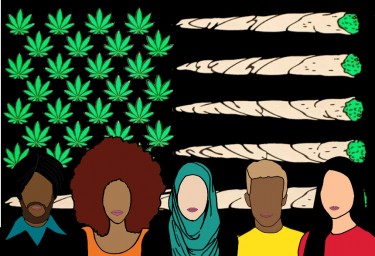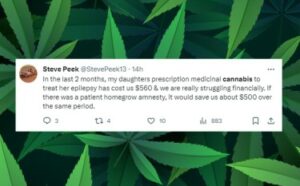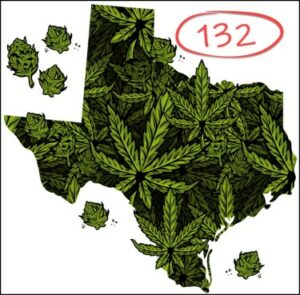
Opposition to New York's marijuana license plan is once again present, this time from a candidate for microbusiness. The complainant asserts that the Equal Protection Clause of the United States Constitution is violated by politicians and regulators' social equality strategy, which they say shows "disfavor to white men."
Valencia Ag LLC filed a lawsuit on January 24th in the Northern District of New York U.S. District Court. The lawsuit argues that the business benefits described in the state law that legalizes marijuana for recreational use in 2021—which is specifically targeted at assisting women and minority entrepreneurs—are illegal and unconstitutional. A goal of the law is to give social equity entrepreneurs 50% of all cannabis licenses.
The lawsuit asserts that the state Office of Cannabis Management and the Cannabis Control Board were aware that they were treading on an illegal path with the development of the social and economic equity (SEE) criteria. It further argues that the discounted licensing fees and other incentives for minority and women applicants constitute discriminatory practices.
The lawsuit states, "Defendants enacted regulations and procedures that provide favor and preference to persons of a selected race or gender to the exclusion of Caucasian or white men for applications for cannabis licenses. In doing so, Defendants violated the Equal Protection Clause of the United States Constitution."
Details of the Lawsuit
Valencia Ag LLC, located in the Syracuse suburb of Jamesville and owned by individuals described in the lawsuit as "males of light pigmentation who might best be described as Caucasian or white men," is at the center of the legal dispute. The company's registration with the secretary of state does not disclose any owners.
According to the lawsuit, Valencia Ag applied for a microbusiness license during the general application window from October to December of the previous year. To expedite the application process, the company secured a real estate location based on regulators' indications that such retail applicants would receive preferential treatment. The company is now committed to a $2,000-a-month lease plus utility costs.
Upon the release of the state's randomized queue for license reviews on January 12, Valencia Ag owners discovered their position was number 2,042. With OCM officials announcing a limited allocation of 110 microbusiness licenses and 250 retailer licenses, the owners of Valencia Ag realized that obtaining a license in the foreseeable future was highly unlikely.
The lawsuit contends that Social and Economic Equity (SEE) applicants, who received preferential treatment, were ranked higher on the list, giving them a "head start" in obtaining a license. This advantage includes quicker earnings of revenues and profits, encountering less competition, and establishing customer loyalty early on.
The suit also accuses the Office of Cannabis Management (OCM) and the Cannabis Control Board (CCB) of neglecting the potential legal challenge, citing a court order from late 2022 when a similar case was filed by Kenneth Gay from Michigan. The lawsuit claimed that residency requirements in New York's conditional adult-use retail dispensary program were unconstitutional. Although settled out of court, the legal action resulted in a recreational marijuana retail license for Variscite NY One. The attorney involved in that case recently filed a new lawsuit on behalf of Variscite Four and Variscite Five, which could potentially freeze retail licensing in New York again.
Valencia Ag argues that the 2022 injunction should have alerted the defendants that their actions were of questionable legality and constitutionality.
The lawsuit also points out that the definition of SEE applicants excludes Caucasians, men, individuals of Jewish heritage, Palestinians, Armenians, Persians, and those considered hermaphrodites, androgynes, or gynandromorphs.
OCM and CCB Diversity Criticized
The legal action also criticizes the racial composition of the Cannabis Control Board (CCB) and the Office of Cannabis Management (OCM), suggesting that individuals like OCM Executive Director Chris Alexander, CCB Chairwoman Tremaine Wright, and others were appointed to their roles solely based on their race or gender.
The lawsuit argues, "The situation of having only minorities and women, and no white man, in the key positions associated with the OCM is statistically aberrant to such a degree as to lead to a reasonable, fair conclusion that the Defendants were selected to their aforementioned positions on the basis of race and gender."
Valencia Ag is seeking punitive damages and "lost profits" from the court, and requests a court order that:
1. Invalidates all Social and Economic Equity (SEE) licenses for businesses owned by minorities and women.
2. Prohibits the OCM from issuing licenses based on race or gender.
3. Revokes any such licenses that have been previously issued.
4. Refund all SEE application fees to the applicants.
5. Compels the OCM to establish equal application fees for all demographics in future applications.
As of Thursday, a spokesperson for the OCM had not provided an immediate response to a request for comment.
Cannabis Attorney Criticizes 'Unfounded Allegations'
Fatima Afia, a cannabis lawyer with expertise in cannabis litigation at Rudick Law Group, shared her perspective on the lawsuit in a LinkedIn post. She noted, "There are numerous unfounded claims in this complaint, such as the assertion that white men are being excluded and disadvantaged in the queue system due to the absence of white men among the members of CCB or OCM."
The attorney concluded that "this particular Complaint and its absurd allegations are not only unfounded but also offensive to anyone with an understanding of the detrimental impact the War on Drugs has had on communities of color and those advocating for an equitable industry."
Bottom Line
The legal action taken against the cannabis social equity program in New York adds another level of intricacy to the continuing discussion over justice and equitable treatment in the developing marijuana sector. The case raises issues regarding the legitimacy of preferential treatment and the wider ramifications for social justice measures as court fights play out. The decision will probably have a long-term effect on how states strike a careful balance between providing equal access for all players and promoting diversity in the cannabis industry.
MORE ON LEGALIZING AND MINORITIY OWNERSHIP, READ ON...
LEGALIZING CANNABIS WON'T FIX MINORITY OWNERSHIP IN CANNABIS
- SEO Powered Content & PR Distribution. Get Amplified Today.
- PlatoData.Network Vertical Generative Ai. Empower Yourself. Access Here.
- PlatoAiStream. Web3 Intelligence. Knowledge Amplified. Access Here.
- PlatoESG. Carbon, CleanTech, Energy, Environment, Solar, Waste Management. Access Here.
- PlatoHealth. Biotech and Clinical Trials Intelligence. Access Here.
- Source: http://cannabis.net/blog/news/the-affirmative-action-debate-lands-in-cannabis-court-are-social-equity-programs-discriminatory
- :has
- :is
- :not
- 110
- 12
- 2022
- 24th
- 250
- a
- access
- Action
- actions
- Adds
- ADvantage
- advocating
- AG
- again
- against
- Alexander
- All
- Allegations
- allocation
- also
- Although
- among
- an
- and
- Announcing
- Another
- any
- anyone
- applicants
- Application
- applications
- applied
- appointed
- ARE
- Argues
- AS
- assisting
- associated
- At
- attorney
- aware
- Balance
- based
- basis
- BE
- been
- behalf
- being
- benefits
- BEST
- between
- board
- businesses
- but
- by
- candidate
- cannabis
- Cannabis Industry
- careful
- case
- Center
- challenge
- Chris
- citing
- claimed
- claims
- color
- comment
- committed
- Communities
- company
- competition
- complaint
- composition
- concluded
- conclusion
- considered
- constitute
- Constitution
- continuing
- control
- Costs
- could
- Court
- criteria
- Criticizes
- customer
- Customer Loyalty
- debate
- December
- decision
- defendants
- definition
- Degree
- Demographics
- described
- developing
- Development
- Director
- Disclose
- discovered
- Discrimination
- discussion
- Dispute
- district
- district court
- Diversity
- does
- doing
- due
- during
- Early
- Earnings
- Economic
- effect
- encountering
- entrepreneurs
- equal
- equality
- equitable
- equity
- establish
- establishing
- estate
- Ether (ETH)
- excluded
- executive
- Executive Director
- expedite
- expertise
- fair
- favor
- Fees
- fights
- filed
- five
- Fix
- For
- foreseeable
- four
- Freeze
- from
- further
- future
- Gender
- General
- Give
- Giving
- goal
- Group
- had
- Have
- having
- head
- help
- her
- heritage
- higher
- highly
- How
- HTTPS
- Illegal
- immediate
- Impact
- in
- Incentives
- includes
- indications
- individuals
- industry
- involved
- Issued
- issues
- issuing
- IT
- ITS
- January
- jewish
- jpg
- Justice
- kenneth
- Key
- lands
- Late
- Law
- lawsuit
- lawyer
- lead
- lease
- Legal
- Legal Action
- legitimacy
- less
- Level
- License
- licenses
- Licensing
- light
- like
- Limited
- List
- Litigation
- LLC
- located
- location
- long-term
- lost
- Loyalty
- man
- management
- marijuana
- measures
- Members
- Men
- Michigan
- might
- minorities
- minority
- neglecting
- New
- new lawsuit
- New York
- no
- noted
- now
- number
- numerous
- NY
- obtaining
- october
- of
- offensive
- Office
- officials
- on
- once
- ONE
- only
- or
- order
- Other
- Others
- out
- over
- owned
- owners
- ownership
- Palestinians
- particular
- path
- persons
- perspective
- plan
- plato
- Plato Data Intelligence
- PlatoData
- Play
- players
- plus
- points
- Politicians
- position
- positions
- Post
- potential
- potentially
- practices
- preferential
- present
- previous
- previously
- probably
- procedures
- process
- profits
- Program
- Programs
- promoting
- protection
- provide
- provided
- providing
- quicker
- Race
- raises
- ramifications
- Randomized
- ranked
- Read
- real
- real estate
- realized
- reasonable
- receive
- received
- recently
- Recreational
- refund
- regarding
- Registration
- regulations
- Regulators
- release
- request
- requests
- Requirements
- residency
- response
- resulted
- retail
- retailer
- revenues
- reverse
- Reviews
- roles
- s
- say
- secretary
- sector
- Secured
- see
- seeking
- selected
- Settled
- shared
- she
- should
- Shows
- similar
- situation
- So
- Social
- social justice
- solely
- specifically
- spokesperson
- start
- State
- States
- statistically
- Strategy
- strike
- such
- Suit
- system
- T
- taken
- targeted
- that
- The
- the Law
- The State
- their
- Them
- There.
- they
- this
- those
- thursday
- time
- to
- toward
- treatment
- u.s.
- unconstitutional
- understanding
- United
- United States
- unlikely
- use
- utility
- violated
- war
- was
- were
- when
- which
- white
- WHO
- wider
- will
- window
- with
- Women
- Won
- would
- Wright
- year
- york
- zephyrnet













